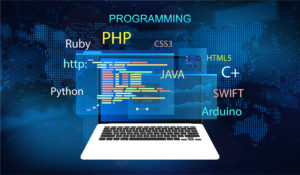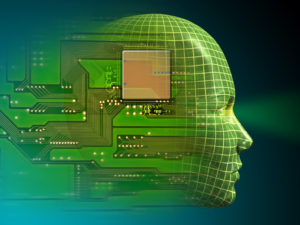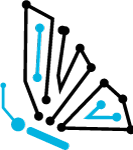Computer Science

TRYENGINEERING CAREER PATHWAYS
Computer Science
Computer scientists are really the designers, creators, and inventors of new technology! By creating new technology, or finding alternative uses for existing resources, they solve complex business, scientific, and general computing problems. Many computer scientists work on multidisciplinary projects, collaborating with electrical engineers, computer engineers, mechanical engineers, and other specialists. They also conduct research on topics including computer hardware architecture, virtual reality, and robotics. As an example, they might research current hardware architecture and discover new ways to boost processing and transmission speeds, or identify new applications for technology that already exists. They may also be involved in the development of games and other interactive applications.
What makes it unique?
Computer scientists are problem solvers and are looking to improve or adapt current technology to meet the needs of the future. Their work often leads to advances that improve technologies and make them more efficient. Examples include boosted computing speeds, improved information security, and next generation networking.
 Degree Connections
Degree Connections
The following are examples of some accredited degrees leading to a career in computer science:
- Computer Science
- Computer Engineering
- Computer Engineering Technology
- Computing
- Software Engineering
- Multimedia and Gaming
- Information Science
- Information Security
Search our global database of accredited engineering programs.
Want to learn more?
Click on the blue tabs to explore the field in more detail and learn about preparation and employment, the green tabs to be inspired by people working in computer science and how they impact the world, and the orange tabs for ideas on how to learn more and you can get involved with activities, camps, and competitions!
Explore

Most computer scientists are working on larger teams but may work independently on a portion. They might be testing a system or piece of computer equipment and considering additional applications. They might be working with algorithms to improve software efficiency…and they work across many industries. They might be involved with developing new programming languages, developing games, or enhancing robotics capabilities. They generally work in office settings but may also visit manufacturing facilities or conduct research at a client location. Work hours are fairly regular except during deadlines or product launches when they may be called upon to put in extra hours to reach a shared goal.
C Programming Language:

The C programming language was a revolutionary contribution developed at Bell Labs in the early 1970s by Dennis Ritchie and Ken Thompson. It changed the world of programming and opened the doors for computing to change many products we use today. It is also still very popular and serves as the basis for operating systems and other languages. It was implemented across many projects at Bell Labs and they quickly gained popularity. It has changed a bit over the years but is still broadly used.
For example, UNIX operating systems are written in C and most of Linux is also in C. Several databases (Oracle, MySQL) and other operating languages such as Python have C at the core for some sections. According to Dennis Ritchie in his book The Development of the C Language, “The C programming language was devised in the early 1970s as a system implementation language for the nascent Unix operating system. Derived from the typeless language BCPL, it evolved a type structure; created on a tiny machine as a tool to improve a meager programming environment, it has become one of the dominant languages of today.”
It is also a language still recommended for computer science students to explore both independently and via courses in university and pre-university settings.
Explore more about C:

The largest employers of computer scientists are software publishers, government research agencies, and computer systems design first. They are employed wherever there is a product or system that using software that could be improved, or repurposed for other applications. That means that globally there are many industries that employ these professionals.
Industries including computer products and services, automotive, healthcare, defense, manufacturing, shipping, chemical, gaming firms, and consumer product groups will all employ computer scientists. Some are also employed by universities, government groups, and some work as independent consultants.
The following is just a sample of some companies, outside of government, so you can explore the type of projects worked on globally:
For most engineering careers:
- a bachelor’s degree is required

bigstock.com/ Thufir - a master’s degree may be recommended for those specializing or interested in management
- students may also start with a related associate degree and then move on to a bachelor’s when they have settled on a degree path.
- many students are required to participate in a co-op program while at university to gain real world experience in their chosen field.
- education doesn’t really stop…engineers need to stay current as technology changes and materials and processes improve over time
- many professional societies offer certificates and coursework to support continuing education for their members.
At the undergraduate level, computer science students would study topics such as algorithms, data structures, software design, concepts of programming languages, and computer organization and architecture. In addition, theoretical foundations, problem analysis, and solution design will be presented within the program of study.
Entry level positions in the field typically require a four year bachelor’s degree in computer science, information science, or computer engineering. State-of-the-art high technology research and development positions frequently require a Masters or Ph.D. degree in either computer science or computer engineering. Computer scientists who work in a specialized field may need knowledge of that field. For example, those working on biomedical applications may need to have taken some biology classes, or may start with an undergraduate degree in Biology or Bioengineering.
It is important to select a degree that has been accredited to meet basic standards. Find out more and browse TryEngineering’s global database of accredited engineering and computing programs.
Be Inspired
One of the best ways to explore what it might be like to work in computer science is to learn about people who contributed historically, or who currently work in the field.
- Sir Tim Berners-Lee an English computer scientist credited as the inventor of the World Wide Web. A graduate of Oxford University, Sir Tim invented the Web while at CERN, the European Particle Physics Laboratory, in 1989. He wrote the first web client and server in 1990. His specifications of URIs, HTTP and HTML were refined as Web technology spread. You can read his answer to questions like “What made you think of the WWW?” here. And in the video to right, he talks about his aspirations for the future of the World Wide Web.
- James Gosling is a Canadian computer scientist who invented the Java programming language. He is a Canadian computer scientist, and earned his bachelor, Master, and PhD all in computer science. Watch an interesting interview with him here.
- Joseph Carl Robnett Licklider was an American psychologist and computer scientist who invented Cloud Computing.
- John McCarthy was a computer scientist and cognitive scientist who was the inventor of Artificial Intelligence (AI).
The World Wide Web is something many of us use every day…certainly it impacts the lives of most people in one way or another every day. If your doctor is researching a new procedure which you might undergo, the Web is impacting you! It has revolutionized communication and the sharing of materials and information globally, and in the scope of human history is a very recent development.
Technically the Web is an information system which identifies documents by URLs (Uniform Resource Locators) and allows them to be accessible over the Internet. Web resources are accessed by a software application called a web browser, and published by a software application called a web server. We use Web resources every day, but the technical process by which files and information are transferred has impacted all corners of the world. Allowing information sharing and education to reach people almost everywhere. The TedTalk on the right explains how the WWW works.
Find out more:

Get Involved
Dig deeper into topics related to computer science that interest you! We’ve arranged a few links below, but think about what interests you about computer science and explore on your own as well!
Explore:
- It’s Time to Learn Computer Science (IEEE)
- Video Gaming is About to Get More Real: Three Innovations You Need to Know (IEEE Computer Society)
- TryEngineering Tuesday: Coding
- TryEngineering News Blog
Watch:
Try it Out:
- Play some games that involve computer engineering:
- Try one of the TryEngineering lessons that focus on computing:
Clubs, competitions, and camps are some of the best ways to explore a career path and put your skills to the test in a friendly-competitive environment.

Clubs:
- Many schools have coding clubs or opportunities for students to get together and work on coding challenges.
- Girls Who Code
- Code.org
Competitions:
- Google’s Coding Competitions designed to enthrall, challenge, and test coders around the world. Try your hand at one, or all three.
- FreeCodeCamp lists popular coding challenge websites.
- CodinGame is designed to help improve programming skills.
Camps:
- TryEngineering Summer Institute, US: Attend the TryEngineering Summer Institute to further coding skills and work on computer related projects.
- Google Computer Science Instituteis a 3-week intro to coding for high school seniors. The program aims to train emerging tech leaders and innovators, held in multiple states each summer, with an inside look into Google operations. Participation is free.
- Women’s Technology Program (WTP) is a four-week summer academic and residential experience where 60 female high school students explore Electrical Engineering and Computer Science (EECS).
- La Capsule, France: 13-week boot camp in coding
- Codeworks, Various locations: immersive coding workshops.
Many universities offer summer engineering, computing and technology experiences. Reach out to your local university’s engineering or computing department to see what they offer.
Did you know you can explore computer science in your community? Consider all the businesses in your area, including your school, a hospital, a bank, or the grocery store that use a secure computer system:
- How do you think an ATM card works? What sort of software and hardware integration is needed to maintain security?

bigstock.com/Mizerek - Does your school require a passcode or card to gain entry? How do these systems work? Reach out to your school to find out the science behind the system!
- What sort of medical records does your doctor or local hospital keep electronically? How do you think they keep them secure and how do they keep records distinct for each person?
- Think about the scanning system software in a grocery store’s self-checkout machines. How do they secure your credit card? How do they use tracking software to maintain inventory? Change pricing?
Find out more:

Be sure to reach out to professional societies focused on computing and computer science where you live. Not all will offer membership to pre-university students, but most offer groups for university students, and certainly offer online resources to help you explore the field.
Some examples of groups focusing on computer science:
Some resources on this page are provided or adapted from the US Bureau of Labor Statistics and the Career Cornerstone Center.
























